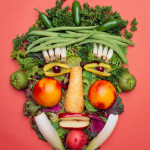Do You “Eat To Live, or, Live To Eat?”
 "You are what you eat." is more than just a catchy phrase your mother may have used to get you to eat right. It's a profound truth. As far back as the "Stone Age", people have recognized the healthful properties of certain foods. And now, in the "Information Age", the importance of nutrition is so well recognized and supported by scientific evidence that virtually every major public health organization in the world makes dietary recommendations.
"You are what you eat." is more than just a catchy phrase your mother may have used to get you to eat right. It's a profound truth. As far back as the "Stone Age", people have recognized the healthful properties of certain foods. And now, in the "Information Age", the importance of nutrition is so well recognized and supported by scientific evidence that virtually every major public health organization in the world makes dietary recommendations.
The link between good nutrition and disease prevention is similarly strong. In the United States, for example, the American Cancer Society estimates that 35% of cancers that are not genetically predetermined can be prevented simply by eating right!
"We must shift our national focus from avoiding nutritional deficiencies to understanding the preventive miracles proper nutrition offers," wrote Dr. Bernadine Healy, former director of the U.S. National Institutes of Health, in her book A New Prescription for Women's Health. "The validity of nutrition as a legitimate scientific discipline can no longer be questioned."
The foods and supplements we consume make up our diet. In recent years, the belief that a balanced diet is a cornerstone of  health has sparked a revolution in the way people think about food. Whereas a diet of meat, potatoes, vegetables and salad constituted "eating well" in much of the 20th century, the diet of the 21st century will likely incorporate more Mediterranean, Asian, and vegetarian eating patterns and low-fat, low-salt, high-fiber foods. Fueled by our growing knowledge of health and nutrition, our new view of food focuses on eating to achieve optimal health.
health has sparked a revolution in the way people think about food. Whereas a diet of meat, potatoes, vegetables and salad constituted "eating well" in much of the 20th century, the diet of the 21st century will likely incorporate more Mediterranean, Asian, and vegetarian eating patterns and low-fat, low-salt, high-fiber foods. Fueled by our growing knowledge of health and nutrition, our new view of food focuses on eating to achieve optimal health.
But, this isn't a new revelation. People have known the health benefits of foods for centuries. It was 17th-century French playwright Molière who said "One should eat to live, not live to eat."
However, eating well (by itself) isn't a guarantee of good nutrition. Foods must pass through six stages: diet (eating healthy foods), digestion (mechanically breaking down foods through mouth chewing and stomach churning), absorption (passage of nutrients from the intestines into the bloodstream), circulation (distribution of nutrients carried in blood to cells), assimilation (incorporation of nutrients into cells), and elimination (removal of metabolic waste products from cells).
Only when all of these challenges are successfully met do our foods provide our bodies with the nutrition they need. So, although it's extremely important, eating well by itself is no guarantee of good nutrition. Nonetheless, a good diet is the foundation upon which our health, fitness and vitality are built.
So, in this instance (at least) I think your mother was right! You are what you eat. Eat healthy to be healthy!
 Loreli is a BCRPA Certified Personal and Strength Trainer. She's fully trained and certified with Can Fit Pro as a Personal Training Specialist. She's also certified to train Agatsu Pro-Grade Kettlebells and Mat 1 Pilates, is a certified Kruger Omni Healing practitioner and YogaFit Instructor. Understanding that a commitment to wellness is not just about exercise, Loreli is also educated about natural nutrition - knowledge she gladly shares with her clients.
Loreli is a BCRPA Certified Personal and Strength Trainer. She's fully trained and certified with Can Fit Pro as a Personal Training Specialist. She's also certified to train Agatsu Pro-Grade Kettlebells and Mat 1 Pilates, is a certified Kruger Omni Healing practitioner and YogaFit Instructor. Understanding that a commitment to wellness is not just about exercise, Loreli is also educated about natural nutrition - knowledge she gladly shares with her clients.




Leave a Reply